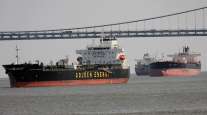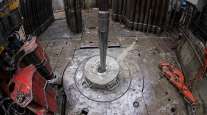Lower Costs Lead Truckers to Buy ’07 Diesels
This story appears in the May 11 print edition of Transport Topics.
Lofty goals for the widespread use of clean alternative fuels at the ports of Los Angeles and Long Beach, Calif., are running into market realities as drayage operators ignore liquefied natural gas engines and instead buy less-expensive diesel trucks.
Since the ports implemented their clean-trucks plans in October, drayage operators have purchased more than 4,000 diesel trucks with engines that meet 2007 U.S. Environmental Protection Agency standards, compared with only about 300 LNG models, port officials said.
“There’s a lot more interest today in buying LNG trucks than there was two years ago,” Long Beach harbor commissioner Mario Cor-dero told Transport Topics. “But if you’re in the private sector, the bottom line is cost, and it’s a very legitimate concern.”
A new LNG truck typically costs $180,000, while a diesel truck is generally about $100,000.
Officials at both ports said they are working on securing new funding streams that would allow them to make up more of the cost differential between LNG and diesel.
When the ports fashioned their emission-reduction plans, they hoped that public funding incentives and notions of corporate responsibility would be enough to send drayage operators rushing to truck dealerships to buy new LNG vehicles. The original goal was to replace half of all the old trucks banned by the two ports with LNG or, eventually, electric vehicles.
But the gentle art of persuasion, and even “free” grant money, so far hasn’t been enough to get carriers to spend more for the LNG models.
Fred Johring, president of Golden State Logistics, East Rancho Dominguez, Calif., told TT his company in recent months has added four 2007 diesel trucks to its fleet of 35. He was open to giving LNG trucks a try, but they were too expensive, even with financial assistance from the ports.
After comparing prices, “I really had no choice,” Johring said. “I get the same return on investment with each vehicle.”
Vic LaRosa, president of Total Transportation Services, Rancho Dominguez, Calif., said he wanted to buy 28 LNG trucks because port and state funding sources were at first offering to finance 80% of the total cost. But at the last minute, public funding was pulled because of budget shortfalls, and the company ended up with only eight, LaRosa said.
“Basically, the reason LNG hasn’t taken off in the market yet is that there’s a price differential between LNG and diesel,” LaRosa said. “Cost is the No. 1 motivating factor.”
Cordero, the Long Beach harbor commissioner and a supporter of alternative fuel trucks, said the ports need to come up with better financial incentives.
But just last month, Long Beach officials eliminated the $35 per 20-foot-container equivalent fee for both LNG and privately funded 2007 diesel-complaint engines (4-13, p. 25). This fee provided cash to subsidize new truck purchases.
The policy change was largely done in reaction to complaints from drayage operators that the Los Angeles port wasn’t charging clean-truck fees for 2007 diesels that pick up cargo. Long Beach did, which made the port and carriers there less competitive.
“So far, we haven’t financed very many trucks, only about 40, because of our partnership with the state, which may pull out of our program,” said Art Wong, a spokesman for the Port of Long Beach. “With the new exemptions — no clean-truck fee for LNG trucks that we finance — we think we will finance many more LNG trucks.”
Geraldine Knatz, the Los Angeles port’s executive director, told harbor commissioners last month that officials are exploring eight possible sources to increase the funding to meet its goal of 900 LNG trucks and 100 electric trucks working the ports by the end of this year.
“At the Port of Los Angeles, we are working toward meeting our LNG truck goal and anticipate increasing the number of alternative fuel vehicles operating at the port substantially this year,” said spokeswoman Lori Kelman. “As for exact percentages, both harbor commission boards have expressed the same alternative fuel vehicle goal and we are working together to meet that goal.”
Meanwhile, the policy change at the Port of Long Beach has drawn criticism from environmental and health groups that said port officials have compromised their goal of replacing old trucks with LNG vehicles by encouraging truckers to choose diesel.
Those criticisms seemed to anger some Long Beach port commissioners, who said at a recent harbor commission meeting that an economic downturn has been a game-changer and that the port must change with market realities.
“Nothing looks the same as it did a year ago,” said harbor commissioner Nick Sramek. “The economy was great, we had trucks lined up here, we had huge numbers of containers coming in, and we were increasing at 10% a year. Everything’s changed.”




